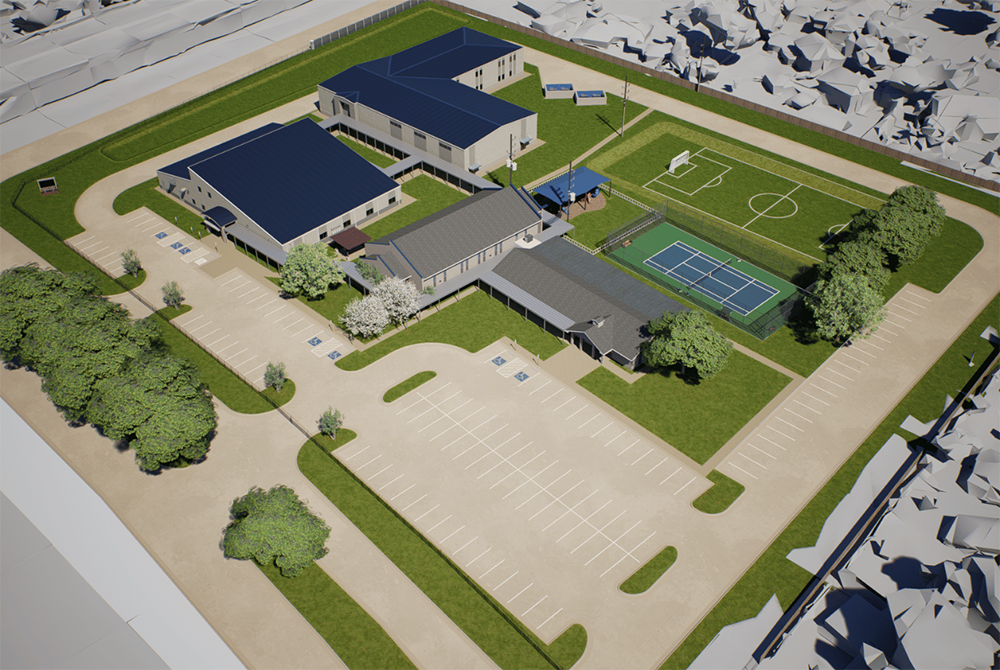
Houston Classical Charter School to Expand with $9M Middle School Campus in Southwest Houston
Houston Classical Charter School (HCCS) is set to expand with the construction of a new middle school campus in Harris County. The $9 million project, located at 6403 Addicks Clodine Road, will break ground on August 15, 2025, with completion scheduled for August 14, 2026. Funded through public sources, the development will add a 29,225-square-foot facility housing classrooms for grades 5 through 8, administrative spaces, and a gymnasium/activity room.
This expansion supports HCCS’s continued growth since its founding in 2019 and aligns with its long-term plan to serve students through the 8th grade. The school currently provides tuition-free classical education from pre-kindergarten through sixth grade, targeting underserved communities in Southwest Houston.
A Classical Education Model With Strong Outcomes
HCCS follows a classical education framework emphasizing literacy, math, science, and ethics through structured, values-based instruction. Its curriculum favors active student engagement, including discussion, analysis, and collaboration, over traditional rote learning methods.
This approach has yielded notable academic performance: internal assessments report that HCCS students outperform neighboring schools by more than 40% in reading and math. The school also integrates core values—Community, Optimism, Respect, and Excellence—into its daily routines to foster a positive and inclusive learning environment. Support services such as free transportation within an eight-mile radius, aftercare, and meal programs help ensure educational access for all students.
Mobile Sidebar Ad
HB 2: Texas Legislation Expands Charter School Funding
The timing of HCCS’s expansion coincides with the passage of House Bill 2 (HB 2) by the Texas Legislature in May 2025. This $8.5 billion public education package increases overall funding for schools and includes key provisions that directly affect charter institutions.
Among the most significant measures:
-
Basic Allotment Increase: HB 2 raises the foundational per-student funding amount. While the Senate version proposed a $55 increase, the House recommended a more substantial $395 raise. Both scenarios provide additional financial resources to charter schools.
-
Teacher and Staff Compensation: The legislation allocates $4.2 billion to improve teacher and staff salaries, including educators at charter schools. Experienced teachers in smaller districts are eligible for raises up to $8,000, aimed at improving staff retention and recruitment.
-
Program-Specific Funding: Nearly $2 billion will support special education services, full-day pre-kindergarten, early learning programs, and career and technical education—all areas where charter schools stand to gain from increased investment.
HB 2 represents a significant policy shift by enhancing financial parity between traditional public schools and charter institutions. This expanded funding base is expected to accelerate growth and infrastructure projects across the charter sector, such as the new HCCS middle school.
Charter Growth in a Broader School Choice Context
While HB 2 focuses on public education funding, Texas lawmakers also passed Senate Bill 2 (SB 2) in 2025—a $1 billion school voucher program allowing families to use public funds for private school tuition. Although this initiative primarily benefits private institutions, it reflects Texas’ broader commitment to expanding school choice.
This policy direction may indirectly influence charter school enrollment and funding dynamics by increasing competition and diversifying parent options. Texas currently ranks among the top states for charter school enrollment, with over 375,000 students attending charter schools statewide as of 2024, according to the Texas Public Charter Schools Association.
Mobile Sidebar Ad
Looking Ahead: What the Expansion Means
The construction of HCCS’s new middle school facility highlights the tangible impact of increased public interest and investment in charter education. As Texas continues to broaden financial support and school choice policies, institutions like HCCS are positioned to play a larger role in the public education system.
This expansion not only meets the immediate needs of a growing student population but also illustrates how state policy and local initiatives are converging to reshape educational access and infrastructure across Greater Houston.
 Tiffany Krenek has been on the My Neighborhood News team since August 2021. She is passionate about curating and sharing content that enriches the lives of our readers in a personal, meaningful way. A loving mother and wife, Tiffany and her family live in the West Houston/Cypress region.
Tiffany Krenek has been on the My Neighborhood News team since August 2021. She is passionate about curating and sharing content that enriches the lives of our readers in a personal, meaningful way. A loving mother and wife, Tiffany and her family live in the West Houston/Cypress region.








